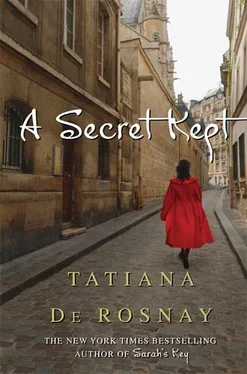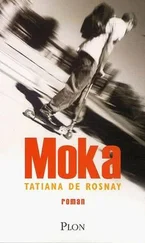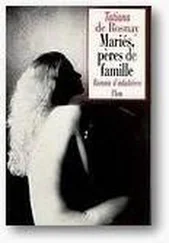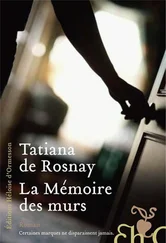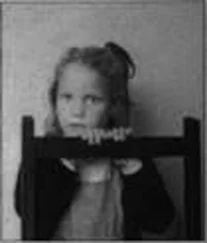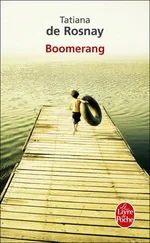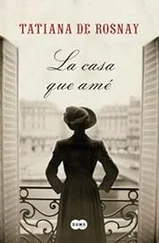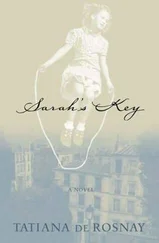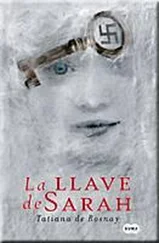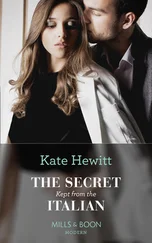We are familiar with all these girls. Valentine, Emma, Bérénice, and Gabrielle. We know all their parents. I observe their mournful faces, and I can guess what they are thinking, what we are all thinking, each and every one of us. This could have been our daughter’s funeral. This could have happened to us. That could be our daughter’s body back at the small graveyard, in that grave, in that coffin covered with white roses.
In the late afternoon, as dusk is already darkening the sky, we leave. We are one of the last families to go. My children seemed drained, as after a long trip. Once in the car, they close their eyes and seem to fall asleep. Astrid remains silent too. She keeps her hand on my thigh, as she used to during those long drives to the Dordogne.
When we arrive at the major road, the one that leads to the highway, the car wheels skirt over a thick coat of mud. A squelching, hissing sound. I peer out at the road but cannot make out what is covering it. A stifling stench finds its way into the car and jolts the children awake. Something rotten, putrid. Astrid clamps a Kleenex to her nose. We drive on slowly, the wheels still churning. Then Lucas gives a little cry, points ahead. A lifeless form lies in the middle of the road, and the car in front of us swerves abruptly to avoid it. It is the meaty carcass of an animal. Now I see that the ground is strewn with viscera. Fighting the fetid stink, I keep my hands steady on the wheel. Lucas screams again. Another shapeless figure suddenly looms, the broken limbs of another animal. Police lights flash, slowing us down. We are told that a truck carrying waste animal remains from a nearby slaughterhouse has lost its entire load. Pails of blood riddled with organs, hides, skins, fatty tissue, guts, and remains of dead stock litter the road for another five kilometers.
It is like a vision from hell. We inch along. The smell of rot is unbearable. Finally the sign indicating the highway appears. Sighs of relief are heard. We speed toward Paris. I drive them to Malakoff, right up to the house on the rue Émile Zola. I leave the motor running.
“Why don’t you stay for dinner?” suggests Astrid.
I shrug. “Why not?”
The children file out of the car. I hear Titus’s joyful bark from the other side of the fence.
“Is Serge there?” I ask carefully.
“No, he’s not.”
I don’t ask where he is. After all, I don’t care. I’m just glad he is not there. I cannot get used to this guy in my house. Yes, it still feels like my house. My house, my wife, my garden. My dog. My old life.

We have dinner just like in the old days, in the open kitchen area that I designed with such care. Titus is beside himself with joy. He keeps putting his humid jaw on my knee, gazing up at me with incredulous ecstasy. The children stay with us for a while, then finally go up to bed. I wonder where Serge is. I keep expecting him to barge through the front door. Astrid does not talk about him. She talks about the children, about today. I listen. How can I explain that I feel I am light-years ahead? That I was there when all this took place?
As she goes on, I make a fire in the fireplace. I can tell that no one has done that for a long time. The grate is empty and dusty. The wood stock is the one I bought, years ago. No cozy tête-à-tête by the hearth for Serge and Astrid. I hold out my hands to the heat. Astrid comes to sit next to me on the floor, resting her head on my arm. I don’t smoke, because I know she hates it. We watch the flames. If anybody passing by happened to glance through the window, they would see a happy couple. They’d assume a happy marriage.
I tell her about Arno. I describe the police station, Arno’s state, and how cold I was the next morning. How he reacted. I say I have not yet talked to him, but I will. That we need to find a good lawyer. She listens, dismayed.
“Why didn’t you call me?”
“I did think about it. But what could you have done from Tokyo? You were already in shock over Pauline’s death.”
She nods. “You’re right.”
“Margaux got her period,” I say.
“I know about that. She told me. Said you dealt with it pretty well, for a dad.”
I feel a glow of pride.
“Really? I’m glad. Because I didn’t do too well when Pauline died.”
“What do you mean?”
“I just couldn’t find the right words. I couldn’t comfort her. So I suggested we call you. And she was incensed.”
I am on the verge of telling her about my mother. But I hold back. Not now. Now is for our own little family, for our children, for their respective problems. Astrid goes to fetch limoncello from the freezer and comes back with the tiny crystal glasses I bought years ago in the Porte de Vanves flea market. We sip in silence. I tell her about Parimbert and the Think Dome. I describe the feng shui office, the black fish, the green tea, the bran scones. She laughs. We both laugh.
Where is Serge? I wonder. Why is he not here? I want to ask her. I don’t. We talk about Mélanie, how well she is healing. We talk about Astrid’s job. About Christmas coming up. What about a joint Christmas at Malakoff, she suggests. Last year was so complicated, Christmas Eve with her, New Year’s Eve with me. What about doing it together this year? Pauline’s death has made everything so sad, so fragile. Yes, why not, I say. But what about Serge, I think, where will he be? I say nothing, but she must have sensed my inner questions.
She says, “Serge blew his top in Tokyo when you called.”
“Why?”
“He is not the father of these children. They have no hold over him.”
“What do you mean?”
“He is younger. He doesn’t know how to deal with all this.”
The fire crackles on merrily. Titus’s mighty snore can be heard. I wait.
“He left. He needs to think things over. He’s with his parents in Lyon.”
Why don’t I feel relief washing through me? Instead, I experience a cautious numbness that puzzles me.
“Are you okay?” I ask gently.
She turns her face to me. It is marked with tiredness and pain.
“Not really,” she whispers.
This should have been my cue. The moment to take her into my arms, the moment I’d been waiting for, for so long, the moment to win her back. To win it all back.
The moment I used to dream about those first nights at rue Froidevaux when I’d get into that empty bed and feel that there was nothing left to live for. The moment I’d been watching for since Naxos, since she took off. The moment I had so clearly imagined.
But I say nothing. I cannot say what she wants me to say. I merely watch her and nod compassionately. She searches my face, my eyes. She doesn’t find what she is looking for, and she breaks into tears.
I take her hand, kiss it softly. She sobs, wipes her cheeks. She whispers, “You know, sometimes I want it back. So badly.”
“What is it you want back?” I ask.
“I want you back, Antoine. I want our old life back.” Her face crumples up again. “I want it all back.”
She plants feverish kisses over my face. Salty kisses. Her warmth, her scent. I want to cry with her and kiss her too, but I can’t. Something stronger is holding me back. I clasp her to me. I finally do kiss her, but the passion has gone. The passion is dead. She strokes me, kisses my neck, my lips, and it feels as if the last time we did this was only yesterday, not two years ago. Desire stirs, for old times, for memories’ sake, then fades away. Now I am holding her the way I would hold my daughter, my sister-the way I could have held my mother. I hold her steadfastly. I kiss her like a brother kisses a sister.
I feel an unhurried wonder creep though me. How is this possible? I no longer love Astrid. I care for her deeply, she is the mother of my children, but I no longer love her. There is tenderness, caring, respect, but I don’t love her the way I used to. And she knows it. She feels it. She stops the kisses, the precise caresses. She draws back, faltering fingers covering her face.
Читать дальше
